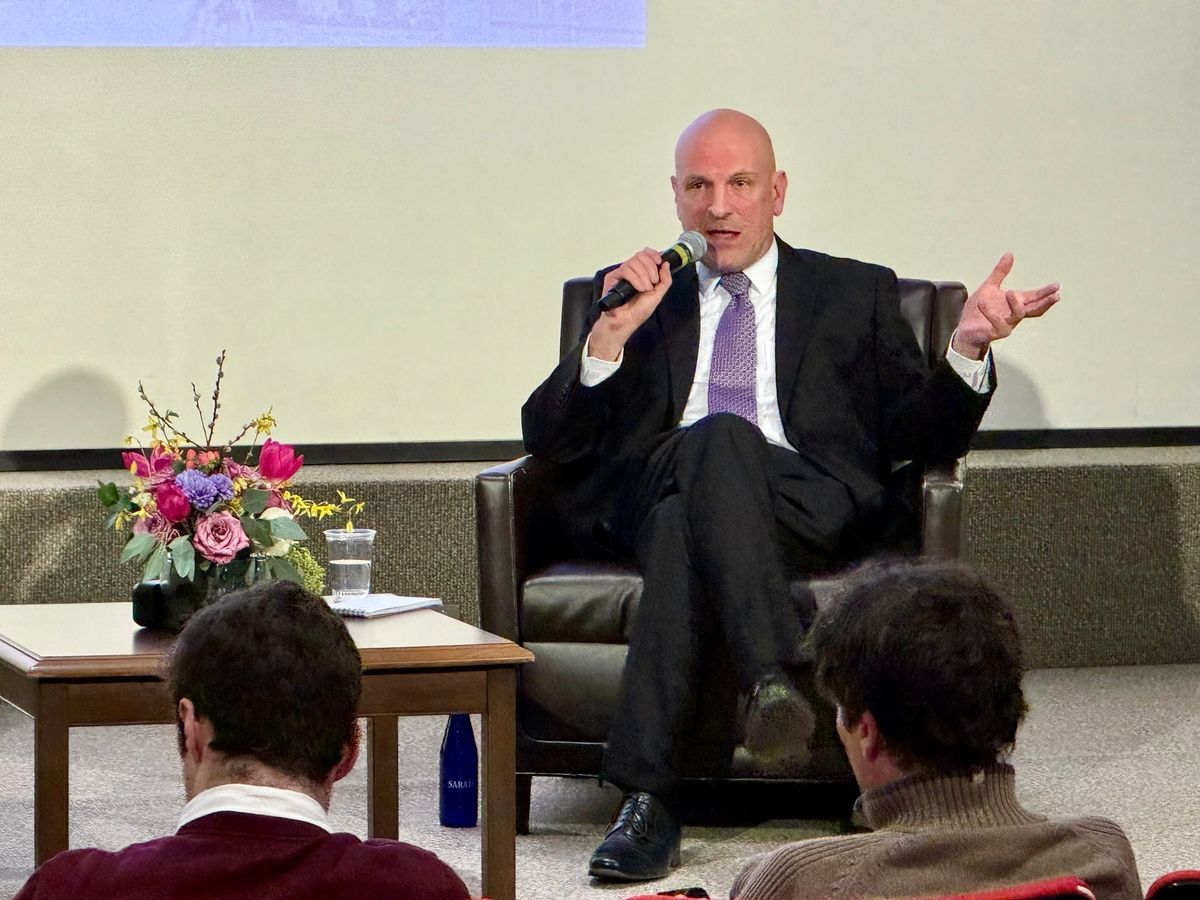Josh Paul Discusses Resignation from State Department Over Israel Policy
Paul made headlines for his resignation in October, in the early stages of Israel’s bombardment of Gaza. He discussed the failures of the U.S. policy in the region and the centrality of arms sales to American diplomacy.

Josh Paul, who made headlines after he resigned from the State Department last year in protest of the U.S.’s support for Israel’s war in Gaza, spoke to an audience in Stirn Auditorium this Tuesday, March 5.
Paul worked for the State Department’s Bureau of Political-Military Affairs, the office that oversees all arms sales and transfers to foreign governments, billions of dollars of which go to Israel each year.
The talk was the first of a three-part series titled “The United States and the Conflict in the Middle East: Domestic Reverberations” sponsored by the Office of the President.
Pawan H. Dhingra, associate provost and associate dean of the faculty, introduced Paul and framed the talk as the college community’s first opportunity to understand “the role of the United States in the conflict.”
Paul began by addressing the elephant in the room, the reason for his resignation on Oct. 18. He shared his outrage over weapon sales to Israel that have resulted in large-scale death and destruction in Gaza. According to Paul, the American willingness to sell weapons to Israel since the Oct. 7 attack is part of more than twenty years of broken U.S. policy in the region.
What troubled Paul most of all, he said, was the complete lack of interest in policy debates within the State Department or in Congress.
“[There was] no interest in debating: Are the weapons that we are providing going to be used appropriately? … Should we be having conversations with the government of Israel about what they're doing?” he said.
In order to have those debates in the public sphere, he decided to leave the State Department.
Paul then framed the U.S. relationship with Israel in the larger context of American foreign policy and the centrality of military aid to U.S. diplomacy. He disputed statements by the current State Department spokesperson, Matt Miller, who has claimed that the U.S. does not direct what their partners in arms transfers do with those weapons.
“That is absolutely not the way it works,” Paul said. “[The Bureau of] Political-Military Affairs is in the State Department … precisely because it is a tool of diplomacy because arms transfers give the United States influence.”
Paul said that the U.S.'s relationship with Israel had become much closer in the context of the Cold War. In 1976, Congress for the first time committed to upholding Israel’s “Qualitative Military Edge,” which remains enshrined in U.S. law.
“Every time we do an arm sale to another country in the Middle East … we have to do an assessment beforehand of, will this harm Israel’s ability to defend itself against any country, any combination of countries, any potential non-state actors, and if it does, we can’t go forward with the sale,” Paul said.
He cast doubt on the U.S.’s policy on Israel for the past thirty years and continued belief in the feasibility of a “two-state solution.”
“If you actually look at a map of the West Bank and see how riven it is, how broken up by roads that are for settlers only, by settlements on hilltops, Palestinian villages down in the valleys, you begin to question how linked is U.S. policy to the reality on the ground,” he said.
Paul concluded his speech by pointing out that U.S. provision of arms and Israel’s war on Gaza is “not helping anyone,” including Israel itself.
“The damage this is doing, both to the immediate relationships of Israel with other governments, and over the longer term to its ability to integrate into that region is going to be generational.”
The U.S.’s enthusiastic support of Israel has also undermined its own credibility on the global stage and damaged institutions like the International Court of Justice, he said.
In a Q&A session following his talk, Paul also addressed a question on how Israel should engage with Hamas in the event of a ceasefire.
“If you really want to get rid of this threat that Hamas poses, you have to provide a political solution … you cannot bomb the resistance as it were out of the Palestinian movement.” He asserts that peace for Israel will necessitate a political settlement that gives Palestinians self-determination.
Reflecting on the talk, Harrison Blum, Director of Religious and Spiritual Life, said, “hearing someone who has made a living, working in international relations, including a focus on military means, make a choice to leave in response to what’s happening in Gaza for me was moving and valuable.”
Cole Warren ’24 shared a similar appreciation for learning from a prominent voice of internal dissent. That said, he also wondered about what comes next.
“For people who are actively campaigning for Palestinian rights, is there any avenue within electoral politics that can be successful, or is it merely a dead end at this time?” he asked.





Comments ()